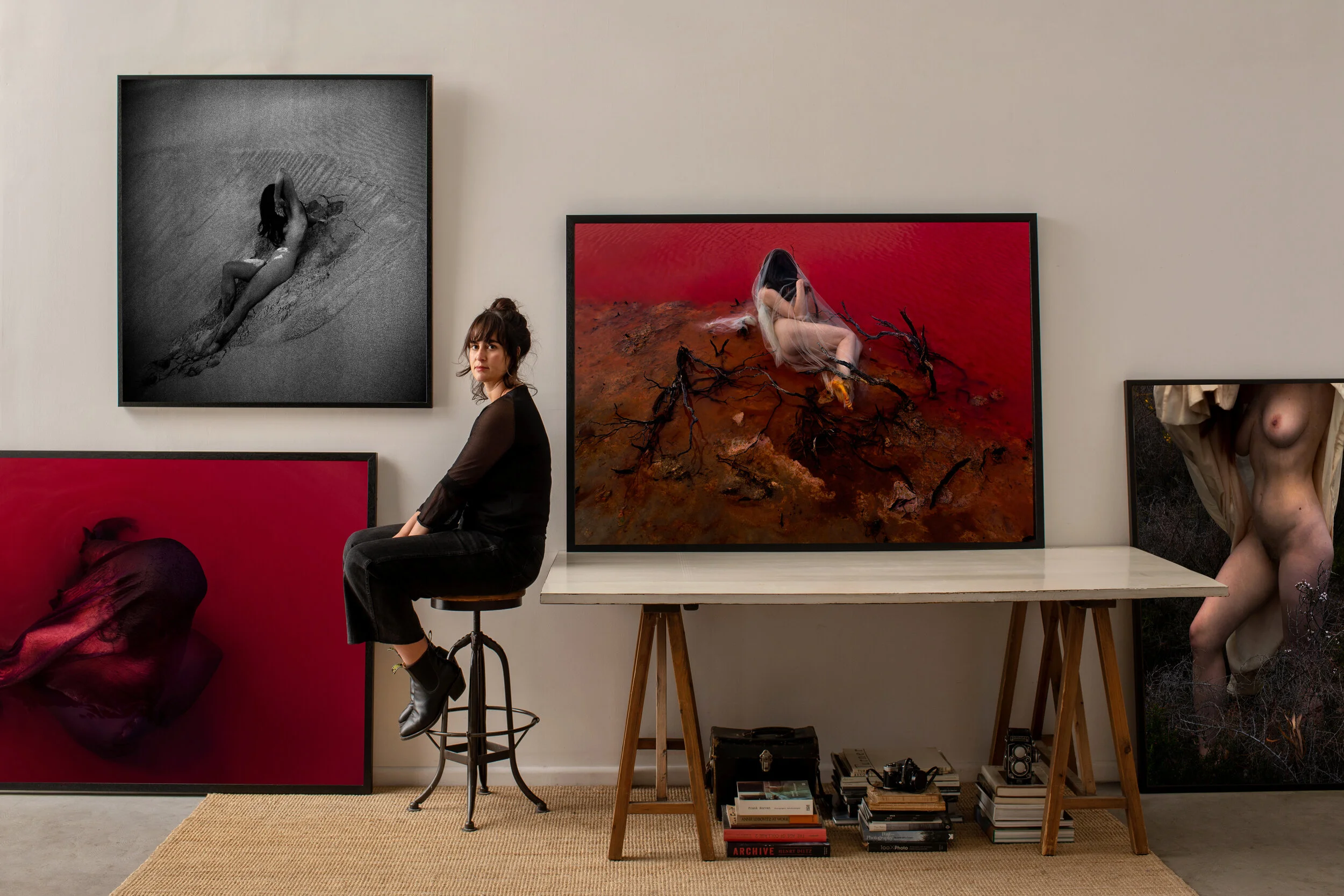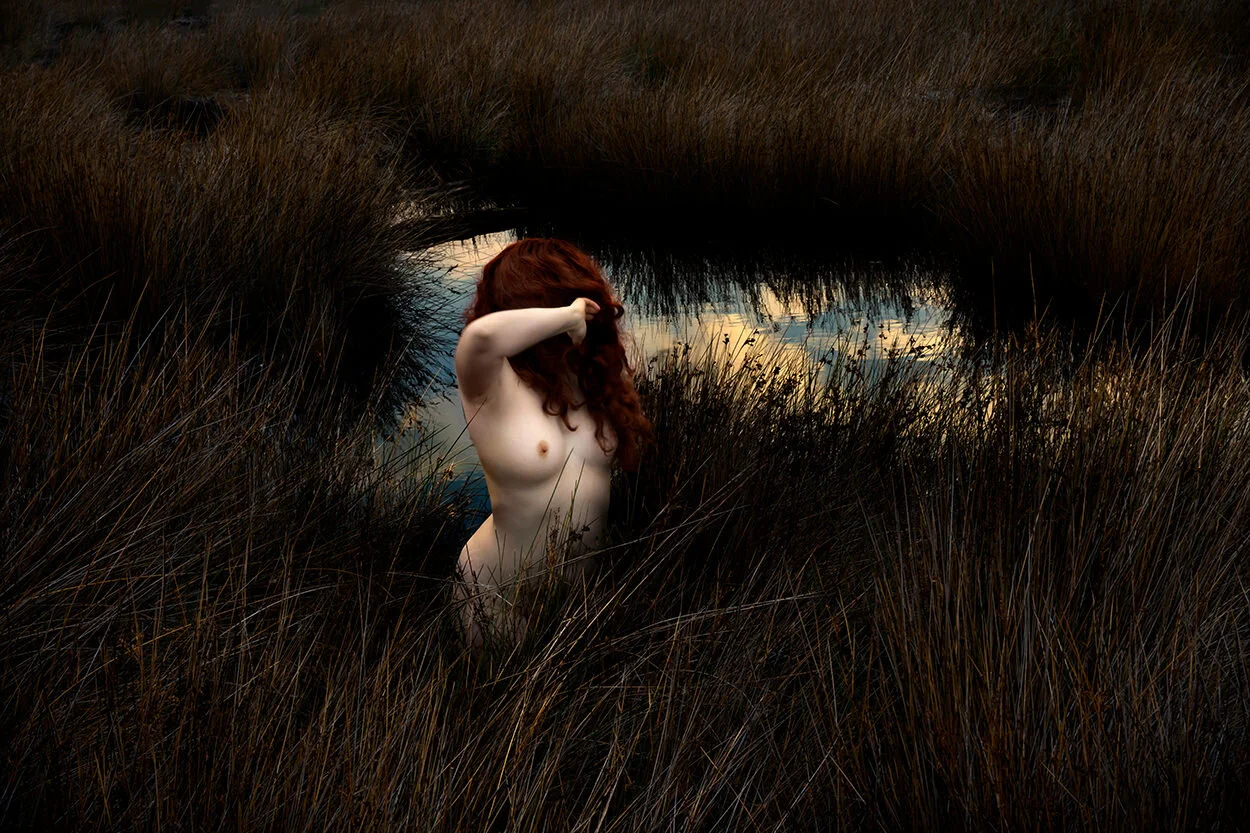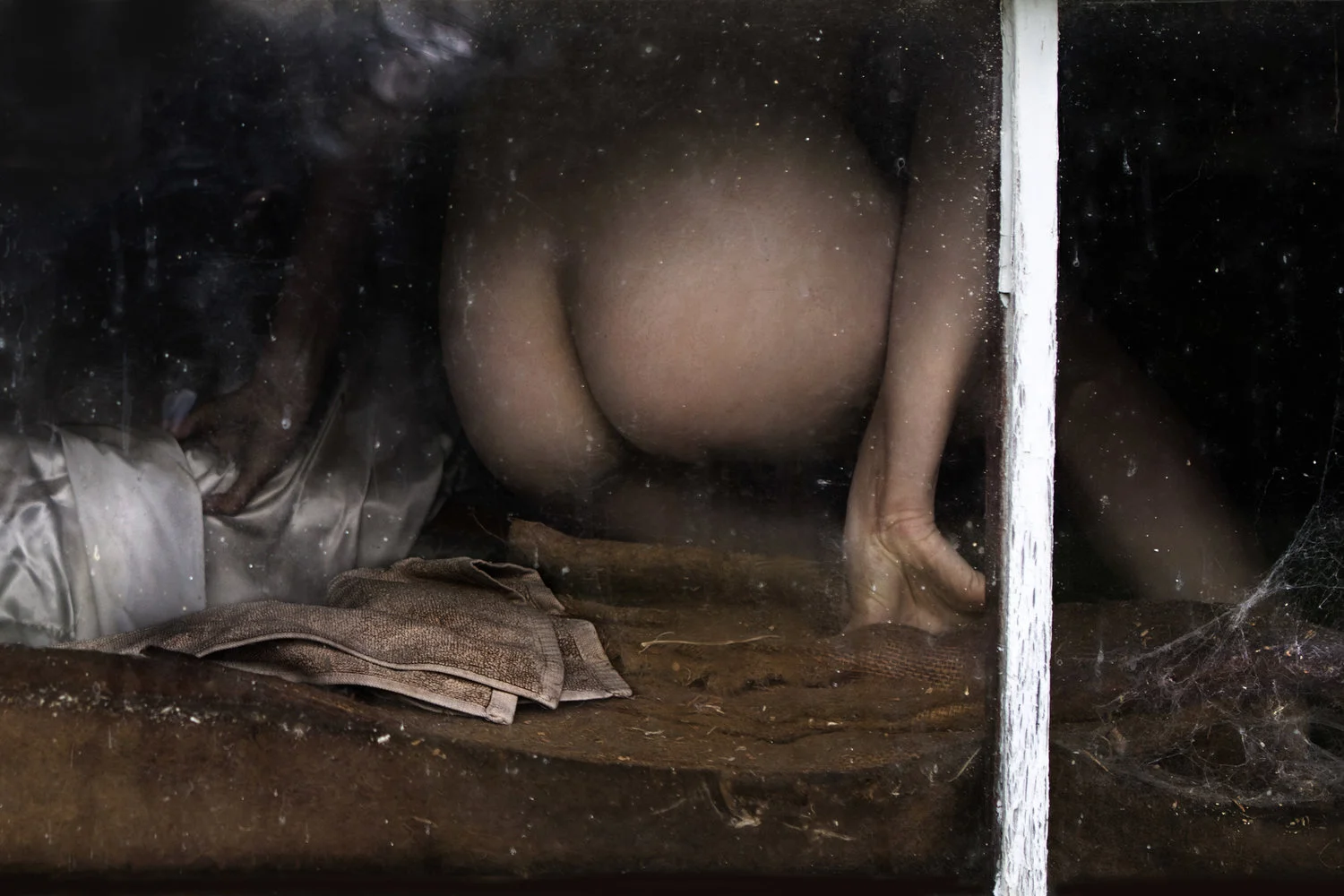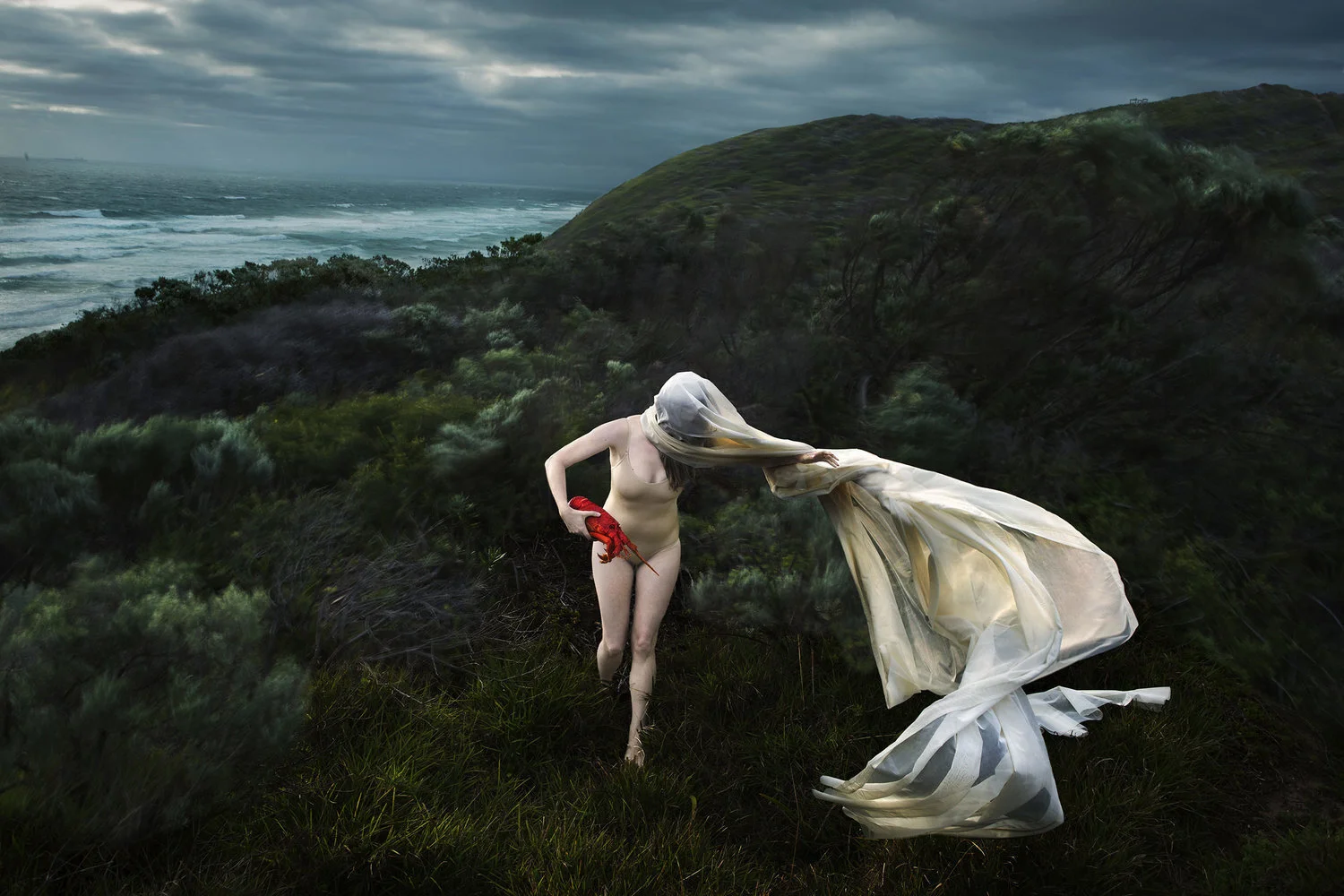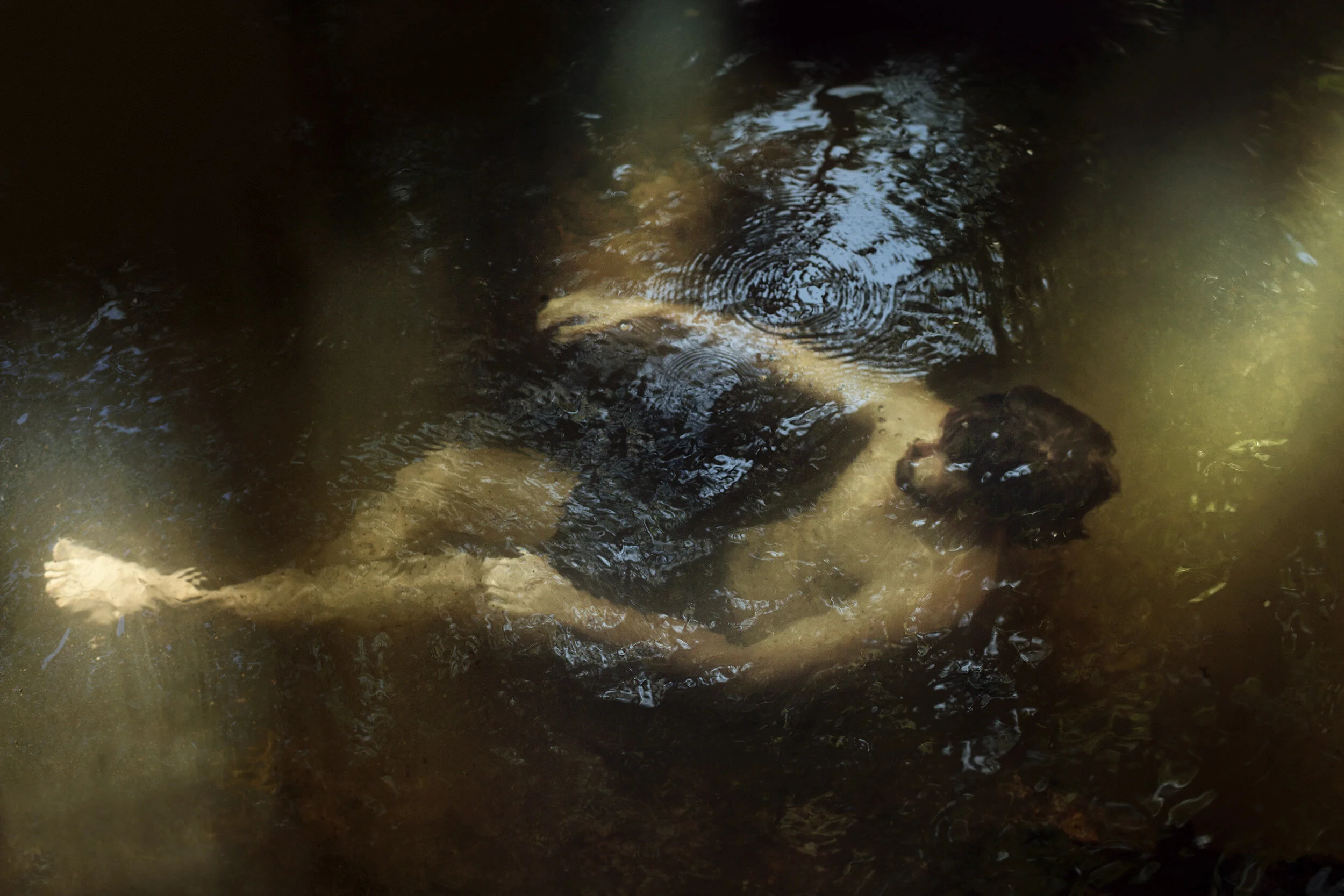The ‘primal’ photography of Lilli Waters is defiantly repairing her past
Two years ago, Lilli Waters returned to Wytaliba where her mother helped start a hippie commune in the 70’s. Here, in a mudbrick house built by her father, Lilli spent the first 18 months of her life. Years later, the same house was vacant and falling apart.
Lilli, a fine art photographer, described returning to the commune near Grafton in New South Wales as strange.
The experience was made more bizarre in that her every reaction was captured for an ABC documentary that followed artists to a place from their past. And after the documentary screened she told me people from the commune contacted her to say her work reminded them of the bush in Wytaliba.
Lilli Waters’ photography is dark and haunting, but she says her style is often formed unconsciously.
While she’s unable able to recall her time in the commune as an infant, she says she has always been drawn to landscapes and believes living in the bush still influences her artwork today.
“The first 18 months of anyone’s life can really steer them in the direction they go,” she says. Lilli has a habit of answering questions broadly, generalising and shifting the focus off herself.
Lilli grew up in a creative family, with inspiration drawn from her fiery grandmother who worked as a photojournalist in the Vietnam War. Lilli’s photography has been featured in a growing list of exhibitions and magazines (even in Christian Grey’s apartment in 50 Shades Freed, a sequel to 50 Shades of Grey). With a violent father, distant mother and a string of abusive relationships, she uses her photography to, in part, reconnect with women.
She primarily photographs female forms in landscapes and water in a state she describes as primal. Not too pretty or sexy – but still womanly and feminine.
“I think that success to me is not going ‘oh that’s nice’, or ‘that’s pretty’ or ‘that’s beautiful’, more like ‘what the hell is this supposed to mean?’” Lilli says, laughing warmly. “Because I don’t know either.”
The style of her personal work – as opposed to her commercial work – is often formed unconsciously. When I asked her if there’s a purposeful uniformity to her images she says she doesn’t think much planning goes into it.
“I’m drawn to shooting in nature and that’s where I feel most comfortable.”
“Confronting”, “violent” and “dark” are all words people have used to describe Lilli’s work to her. Though, she explained, when she photographs she doesn’t have those words in mind.
“You’re not out there going, I’m going to make something dark, it’s just very organic.”
At two years old, her family made the move to Nimbin in New South Wales where Lilli's mother had originally planned to settle before finding it to be overcrowded. It was here her parents’ relationship broke down.
“There was a lot of violence at the commune, generally with men. A lot of the women left with their babies and my mum did that too,” she says, adding her father has schizophrenia and was violent.
Lilli no longer has contact with her father and fell out of touch with her mother for 15 years. She thinks this is likely to have had a bearing on her work. So did her experience in abusive relationships with boyfriends who didn’t let her have female friends. Bullying she experienced from females both at school and university also complicated her relationship with women.
So why women in landscapes, or submerged in water?
Lilli thinks in some ways her photography has acted as a tool to remould her perception of women. A medium to appease a curiosity and tackle a fear.
“Maybe it was a good way of developing a relationship with these women I was shooting and starting to regain trust and get to know them again,” Lilli says. “It's taken me six years to go ‘oh, ok maybe that was why’.”
“Art is so important – but then also the world’s dying and we’re just making art.”
When pressed about her relationship with her mother, she brushed it off with a “we’re ok”, summing it up by “we talk”.
But Lilli’s eyes became bright with admiration as she described her grandmother, Elaine Moir, who played an important role in raising her.
“My grandmother was a photographer. My whole family is creative,” she told me.
Elaine Moir – who Lilli described as a fighter, humanitarian and a hippie – was a photojournalist in Saigon during the Vietnam War, and was often found cleaning creeks, stopping trees from being cut down and saving hundreds of Vietnamese orphans. In fact, her grandmother inspired Lilli with early ambitions to become a photojournalist.
Perhaps the most shocking story she shared was when, from Vietnam, Elaine contacted her son at school in Australia and advised him to call a senior Whitlam government minister to tell him to send a plane. After being turned away by a school secretary, Lilli’s uncle made the call on a pay phone. A plane was sent to rescue Elaine and the orphans in her care the next day. She was dubbed a “waif smuggler”, for her efforts saving the malnourished Vietnamese children.
Lilli believes her grandmother’s humanitarian values have been instilled in her. For instance, Lilli’s decisions surrounding her commercial work are informed by how sustainable a company is.
Though her grandmother has been gone for a while now, Lilli told me she feels the fear and hopelessness – mirrored by many – concerning the issue of climate change that still remains from her grandmother’s time.
“These problems have been around since the 1960’s and 70’s. Nothing’s changed – in fact it’s gotten worse.”
She tells me she feels like she’s only just scratching the surface of giving a voice to issues that keep her up at night through her personal work.
“Art is so important – but then also the world’s dying and we’re just making art,” she says.
When discussing her conceptual images, she alluded to her work having an accidental power, that of being less planned and more driven by her unconscious. She described she’s taking more deliberate footing for a future project.
Though her work hints at gender inequality and environmental issues, Lilli also wants to create art that is more explicit in its message. In fact, she is in the early stages of planning to amplify under-reported issues in the form of photo essays, in collaboration with journalists.
“I mean, it’s not like I’m going to change the world, or that these stories aren’t being covered already, but I feel like it’s kind of my duty to use my skills for good.”
She believes now, more than ever, it’s important to remember people like her grandmother who were fighting anyway – despite the challenges.
“I would just feel better if I was doing something.”
When I asked Lilli about her proudest moment in her career so far, she referenced her first exhibition: SHE RAW. The exhibition consisted of 41 images of 41 women captured over 18 months – the result of having six months to spare upon leaving an unsatisfying job as a retoucher. The show saw her raise over $5,000 for the White Ribbon Foundation, an organisation that works to prevent violence against women.
“I wish I could pull a crowd like that now, but I can’t,” Lilli says, laughing.
She described people dotted down the street waiting patiently to get in, and noteworthy artist Bill Henson as an attendee, an incredible feat for her first exhibition.
Exuding a humble wisdom that made me feel what I can only describe as comfortably in awe, Lilli tells me her personal work is both therapeutic and “searching”. But she’s not yet sure exactly what she’s looking for.
“I think it just comes with age – you get older and you work through your stuff and you realise the world’s not so dangerous,” she says. “There are no bullies anymore and there’s no scary man.”
When I asked if she’s found what she was searching for Lilli says: “I don’t think you ever find those kind of things. You might look back when you’re old, and look back at images you made 30 years ago and go ‘oh, it was there’.”
For now Lilli’s content with edging closer to a discovery, explaining that much of the beauty is in looking back.
“If you think you found it, you wouldn’t keep looking for it.”
Tessa Ogle is a writer from Melbourne, a caffeine addict and is partial to a pun or two.

